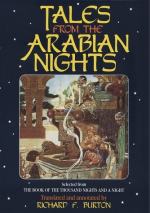[FN#69] Arab, “Jawush” for Chawush (vulg. Chiaush) Turk.=an army serjeant, a herald or serjeant at arms; an apparitor or officer of the Court of Chancery (not a “Mace-bearer or Messenger,” Scott). See vol. vii. 327.
[FN#70] Arab. from Persian “Bimaristan,” a “sick-house,” hospital, a mad-house: see vol. i. 288.
[FN#71] The text says only that “he was reading:” sub. the Holy Volume.
[FN#72] Ms. vol. iii., pp. 142-168. Scott, “Story of the First Lunatic,” pp. 31 44. Gauttier, Histoire du Premier Fou, vol. vi. 187. It is identical with No. ii. of Chavis and Cazotte, translated by C. de Perceval, Le Bimaristan (i.e. the Hospital), ou Histoire du jeune Marchand de Bagdad et de la Dame inconnue (vol. viii. pp. 179-180). Heron terms it the “Story of Halechalbe (Ali Chelebi?) and the Unknown Lady,” and the narrative is provided with a host of insipid and incorrect details, such as “A gentleman enjoying his pipe.” The motif of this tale is common in Arab. folk lore, and it first appears in the “Tale of Aziz and Azizah,” ii. 328. A third variant will occur further on.
[FN#73] Spelt in vol. iii. 143 and elsewhere, “Khwaja” for “Khwajah.”
[FN#74] Arab. “Hubban li-raasik,"=out of love for thy head, i.e. from affection for thee. Dr. Steingass finds it analogous with the Koranic “Hubban li ’llahi” (ii. 160), where it is joined with “Ashaddu"=stronger, as regards love to or for Allah, more Allah loving. But it can stand adverbially by itself=out of love for Allah, for Allah’s sake.
[FN#75] Arab. “Zahr,” lit. and generically a blossom; but often used in a specific sense throughout The Nights.
[FN#76] Arab. “Kursi” here=a square wooden seat without back and used for sitting cross-legged. See Suppl. vol. i. 9.
[FN#77] Arab. “Sujjadah"=lit. a praying carpet, which Lane calls “Seggadeh.”
[FN#78] Arab. “Wakil,” lit.=agent: here the woman’s representative, corresponding roughly with the man who gives away the bride amongst ourselves.
[FN#79] The mention of coffee and sherbet, here and in the next page, makes the tale synchronous with that of Ma’aruf or the xviith. century.
[FN#80] The Ms. writes “Zardakat” for “Zardakhan”: see below.
[FN#81] Scott (p. 36) has “mahazzim (for mahazim), al Zerdukkaut (for al-Zardakhan)” and “munnaskif (for manashif) al fillfillee.” Of the former he notes (p. 414) “What this composition is I cannot define: it may be translated compound of saffron, yoke of egg or of yellowish drugs.” He evidently confounds it with the Pers. Zard-i-Khayah=yoke of egg. Of the second he says “compound of peppers, red, white and black.” Lane (The Nights, vol. i. p. 8) is somewhat scandalised at such misrepresentation, translating the first “apron-napkins of thick silk,” and the second “drying towels of Lif or palm-fibre,” further suggesting that the text may have dropped a conjunction=drying towels and fibre.




